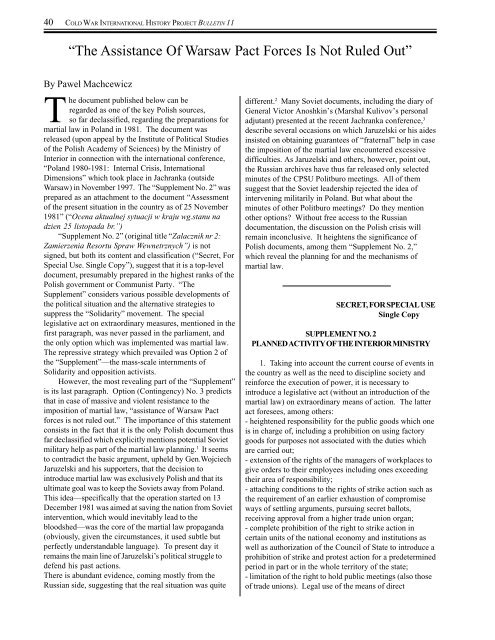The Anoshkin Notebook on the Polish Crisis, December 1981
The Anoshkin Notebook on the Polish Crisis, December 1981
The Anoshkin Notebook on the Polish Crisis, December 1981
You also want an ePaper? Increase the reach of your titles
YUMPU automatically turns print PDFs into web optimized ePapers that Google loves.
40 COLD WAR INTERNATIONAL HISTORY PROJECT BULLETIN 11<br />
“<str<strong>on</strong>g>The</str<strong>on</strong>g> Assistance Of Warsaw Pact Forces Is Not Ruled Out”<br />
T<br />
he document published below can be<br />
regarded as <strong>on</strong>e of <strong>the</strong> key <strong>Polish</strong> sources,<br />
so far declassified, regarding <strong>the</strong> preparati<strong>on</strong>s for<br />
martial law in Poland in <strong>1981</strong>. <str<strong>on</strong>g>The</str<strong>on</strong>g> document was<br />
released (up<strong>on</strong> appeal by <strong>the</strong> Institute of Political Studies<br />
of <strong>the</strong> <strong>Polish</strong> Academy of Sciences) by <strong>the</strong> Ministry of<br />
Interior in c<strong>on</strong>necti<strong>on</strong> with <strong>the</strong> internati<strong>on</strong>al c<strong>on</strong>ference,<br />
“Poland 1980-<strong>1981</strong>: Internal <strong>Crisis</strong>, Internati<strong>on</strong>al<br />
Dimensi<strong>on</strong>s” which took place in Jachranka (outside<br />
Warsaw) in November 1997. <str<strong>on</strong>g>The</str<strong>on</strong>g> “Supplement No. 2” was<br />
prepared as an attachment to <strong>the</strong> document “Assessment<br />
of <strong>the</strong> present situati<strong>on</strong> in <strong>the</strong> country as of 25 November<br />
<strong>1981</strong>” (“Ocena aktualnej sytuacji w kraju wg.stanu na<br />
dzien 25 listopada br.”)<br />
“Supplement No. 2” (original title “Zalacznik nr 2:<br />
Zamierzenia Resortu Spraw Wewnetrznych”) is not<br />
signed, but both its c<strong>on</strong>tent and classificati<strong>on</strong> (“Secret, For<br />
Special Use. Single Copy”), suggest that it is a top-level<br />
document, presumably prepared in <strong>the</strong> highest ranks of <strong>the</strong><br />
<strong>Polish</strong> government or Communist Party. “<str<strong>on</strong>g>The</str<strong>on</strong>g><br />
Supplement” c<strong>on</strong>siders various possible developments of<br />
<strong>the</strong> political situati<strong>on</strong> and <strong>the</strong> alternative strategies to<br />
suppress <strong>the</strong> “Solidarity” movement. <str<strong>on</strong>g>The</str<strong>on</strong>g> special<br />
legislative act <strong>on</strong> extraordinary measures, menti<strong>on</strong>ed in <strong>the</strong><br />
first paragraph, was never passed in <strong>the</strong> parliament, and<br />
<strong>the</strong> <strong>on</strong>ly opti<strong>on</strong> which was implemented was martial law.<br />
<str<strong>on</strong>g>The</str<strong>on</strong>g> repressive strategy which prevailed was Opti<strong>on</strong> 2 of<br />
<strong>the</strong> “Supplement”—<strong>the</strong> mass-scale internments of<br />
Solidarity and oppositi<strong>on</strong> activists.<br />
However, <strong>the</strong> most revealing part of <strong>the</strong> “Supplement”<br />
is its last paragraph. Opti<strong>on</strong> (C<strong>on</strong>tingency) No. 3 predicts<br />
that in case of massive and violent resistance to <strong>the</strong><br />
impositi<strong>on</strong> of martial law, “assistance of Warsaw Pact<br />
forces is not ruled out.” <str<strong>on</strong>g>The</str<strong>on</strong>g> importance of this statement<br />
c<strong>on</strong>sists in <strong>the</strong> fact that it is <strong>the</strong> <strong>on</strong>ly <strong>Polish</strong> document thus<br />
far declassified which explicitly menti<strong>on</strong>s potential Soviet<br />
military help as part of <strong>the</strong> martial law planning. 1 By Pawel Machcewicz<br />
It seems<br />
to c<strong>on</strong>tradict <strong>the</strong> basic argument, upheld by Gen.Wojciech<br />
Jaruzelski and his supporters, that <strong>the</strong> decisi<strong>on</strong> to<br />
introduce martial law was exclusively <strong>Polish</strong> and that its<br />
ultimate goal was to keep <strong>the</strong> Soviets away from Poland.<br />
This idea—specifically that <strong>the</strong> operati<strong>on</strong> started <strong>on</strong> 13<br />
<strong>December</strong> <strong>1981</strong> was aimed at saving <strong>the</strong> nati<strong>on</strong> from Soviet<br />
interventi<strong>on</strong>, which would inevitably lead to <strong>the</strong><br />
bloodshed—was <strong>the</strong> core of <strong>the</strong> martial law propaganda<br />
(obviously, given <strong>the</strong> circumstances, it used subtle but<br />
perfectly understandable language). To present day it<br />
remains <strong>the</strong> main line of Jaruzelski’s political struggle to<br />
defend his past acti<strong>on</strong>s.<br />
<str<strong>on</strong>g>The</str<strong>on</strong>g>re is abundant evidence, coming mostly from <strong>the</strong><br />
Russian side, suggesting that <strong>the</strong> real situati<strong>on</strong> was quite<br />
different. 2 Many Soviet documents, including <strong>the</strong> diary of<br />
General Victor <str<strong>on</strong>g>Anoshkin</str<strong>on</strong>g>’s (Marshal Kulivov’s pers<strong>on</strong>al<br />
adjutant) presented at <strong>the</strong> recent Jachranka c<strong>on</strong>ference, 3<br />
describe several occasi<strong>on</strong>s <strong>on</strong> which Jaruzelski or his aides<br />
insisted <strong>on</strong> obtaining guarantees of “fraternal” help in case<br />
<strong>the</strong> impositi<strong>on</strong> of <strong>the</strong> martial law encountered excessive<br />
difficulties. As Jaruzelski and o<strong>the</strong>rs, however, point out,<br />
<strong>the</strong> Russian archives have thus far released <strong>on</strong>ly selected<br />
minutes of <strong>the</strong> CPSU Politburo meetings. All of <strong>the</strong>m<br />
suggest that <strong>the</strong> Soviet leadership rejected <strong>the</strong> idea of<br />
intervening militarily in Poland. But what about <strong>the</strong><br />
minutes of o<strong>the</strong>r Politburo meetings? Do <strong>the</strong>y menti<strong>on</strong><br />
o<strong>the</strong>r opti<strong>on</strong>s? Without free access to <strong>the</strong> Russian<br />
documentati<strong>on</strong>, <strong>the</strong> discussi<strong>on</strong> <strong>on</strong> <strong>the</strong> <strong>Polish</strong> crisis will<br />
remain inc<strong>on</strong>clusive. It heightens <strong>the</strong> significance of<br />
<strong>Polish</strong> documents, am<strong>on</strong>g <strong>the</strong>m “Supplement No. 2,”<br />
which reveal <strong>the</strong> planning for and <strong>the</strong> mechanisms of<br />
martial law.<br />
SECRET, FOR SPECIAL USE<br />
Single Copy<br />
SUPPLEMENT NO. 2<br />
PLANNED ACTIVITY OF THE INTERIOR MINISTRY<br />
1. Taking into account <strong>the</strong> current course of events in<br />
<strong>the</strong> country as well as <strong>the</strong> need to discipline society and<br />
reinforce <strong>the</strong> executi<strong>on</strong> of power, it is necessary to<br />
introduce a legislative act (without an introducti<strong>on</strong> of <strong>the</strong><br />
martial law) <strong>on</strong> extraordinary means of acti<strong>on</strong>. <str<strong>on</strong>g>The</str<strong>on</strong>g> latter<br />
act foresees, am<strong>on</strong>g o<strong>the</strong>rs:<br />
- heightened resp<strong>on</strong>sibility for <strong>the</strong> public goods which <strong>on</strong>e<br />
is in charge of, including a prohibiti<strong>on</strong> <strong>on</strong> using factory<br />
goods for purposes not associated with <strong>the</strong> duties which<br />
are carried out;<br />
- extensi<strong>on</strong> of <strong>the</strong> rights of <strong>the</strong> managers of workplaces to<br />
give orders to <strong>the</strong>ir employees including <strong>on</strong>es exceeding<br />
<strong>the</strong>ir area of resp<strong>on</strong>sibility;<br />
- attaching c<strong>on</strong>diti<strong>on</strong>s to <strong>the</strong> rights of strike acti<strong>on</strong> such as<br />
<strong>the</strong> requirement of an earlier exhausti<strong>on</strong> of compromise<br />
ways of settling arguments, pursuing secret ballots,<br />
receiving approval from a higher trade uni<strong>on</strong> organ;<br />
- complete prohibiti<strong>on</strong> of <strong>the</strong> right to strike acti<strong>on</strong> in<br />
certain units of <strong>the</strong> nati<strong>on</strong>al ec<strong>on</strong>omy and instituti<strong>on</strong>s as<br />
well as authorizati<strong>on</strong> of <strong>the</strong> Council of State to introduce a<br />
prohibiti<strong>on</strong> of strike and protest acti<strong>on</strong> for a predetermined<br />
period in part or in <strong>the</strong> whole territory of <strong>the</strong> state;<br />
- limitati<strong>on</strong> of <strong>the</strong> right to hold public meetings (also those<br />
of trade uni<strong>on</strong>s). Legal use of <strong>the</strong> means of direct


